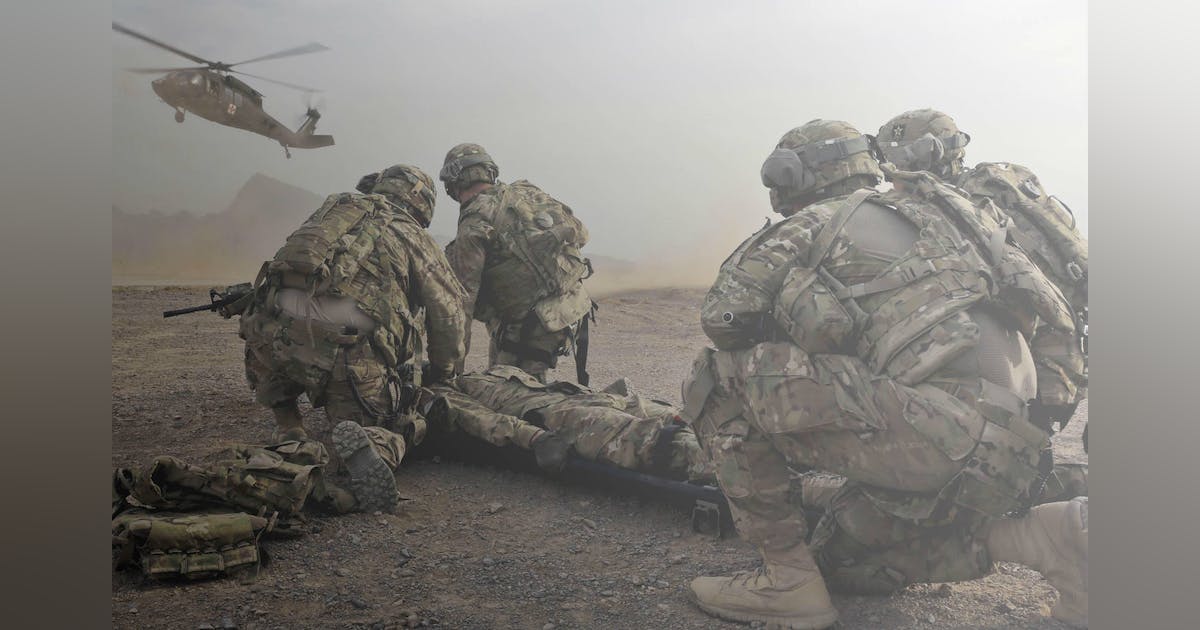Four research companies eye artificial intelligence (AI) and machine learning for battlefield medicine |
 |
| WRIGHT-PATTERSON AFB, Ohio U.S. military researchers are asking four technology companies to develop artificial intelligence (AI) and machine learning technologies for difficult jobs like combat medicine triage, which refers to sorting wounded warfighters according to their need for medical attention.Officials of the U.S. Air Force Research Laboratory at Wright-Patterson Air Force Base, Ohio, announced four contracts collectively worth $18.5 million on Friday for the In the Moment (ITM) project.ITM seeks to develop difficult domains are where trusted decision-makers disagree; no right answer exists; and uncertainty, time-pressure, resource limitations, and conflicting values create significant decision-making challenges. Other examples include first response and disaster relief.The Air Force Research Lab is awarding the battlefield medicine contracts on behalf of the U.S. Defense Advanced Research Projects Agency (DARPA) in Arlington, Va.Related: The U.S. Army wants to use artificial intelligence (AI) to make decisions and take action on the battlefieldITM contractors are:-- CACI International in Arlington, Va., which won a $6.6 million contract;-- Parallax Advanced Research Corp. in Beavercreek, Ohio, which won a $4.1 million contract;-- SOAR Technology Inc. in Ann Arbor, Mich., which won a $4 million contract; and-- Raytheon BBN Technologies Corp. in Cambridge, Mass., which won a $3.8 million contract.The DARPA ITM project focuses on two areas -- small unit triage in austere environments, and mass casualty triage -- and seeks to develop techniques that enable building, evaluating, and fielding trusted algorithmic decision-makers for mission-critical operations where there is no right answer and, consequently, ground truth does not exist.Related: Artificial intelligence and machine learning for unmanned vehiclesResearchers are looking for capabilities that quantify algorithmic decision-makers with key decision-making attributes of trusted humans; incorporate key human decision-maker attributes into more human-aligned, trusted algorithms; enable the evaluation of human-aligned algorithms in difficult domains where humans disagree and there is no right outcome; and develop approaches that support the use of human-aligned algorithms in difficult domains.Difficult decisions occur when the decision-maker is confronted with challenges that include too many or too few options, too much or too little information, uncertainty about the consequences of decisions, and uncertainty about the value of foreseeable outcomes.ITM seeks to develop AI and machine learning algorithms based on key human attributes as the basis for trust in algorithmic decision-makers, as well as a computational framework for key human attributes and an alignment score match the algorithmic decision-maker to key human decision-makers.Related: Army to beef-up battle tanks with advanced networking, machine learning, and artificial intelligence (AI)ITM is 3.5-year, two-phase program that focuses on four technical areas: decision-maker characterization; human-aligned algorithms; evaluation; and policy and practice.Decision-maker characterization seeks to develop technologies that identify and model key decision-making attributes of trusted humans to produce a quantitative decision-maker alignment score.Related: L3Harris developing artificial-intelligence (AI)-based image processing tool for intelligence analystsHuman-aligned algorithms should be able to balance situational information with a preference for key decision-maker attributes. Evaluation will assess the willingness of humans to delegate difficult decisions to AI computers.Policy and practice will develop recommendations for how military leaders can update policies to take advantage of AI and machine learning in combat medical triage.For more information contact the Air Force Research Laboratory online at www.afrl.af.mil, or DARPA at www.darpa.mil. |
Apr 19th, 2023 |
| source |